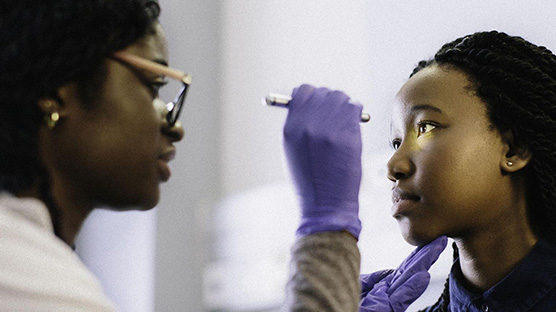
Regular eye care can have a life-changing impact, and taking steps to support your student’s vision now can make a difference. Common eye problems can lead to inflammation, degeneration, swelling and scarring, resulting in vision loss and even blindness. Identifying problems early on can help prevent or reduce our risk.
1. Schedule regular eye exams with an eye doctor.
Everyone needs their eyes and vision checked regularly to assess vision changes and, if necessary, to ensure your prescription for eyeglasses or contact lenses is up to date. Comprehensive dilated eye exams help find problems that may not have warning signs and can provide an opportunity for early treatment and prevention. Your student’s eye doctor may be able to detect certain conditions, such as diabetes or high blood pressure, even before your primary care doctor. The University Health Center offers these exam services within our optometry department – call 402.472.5000 schedule an appointment.
2. Consider if vision corrective surgery may be right for you.
Although vision correction surgery, or refractive surgery, doesn’t change the eyes' normal aging process, it can improve your quality of life through better vision, freedom from glasses or contacts and money savings.
Our partners at Truhlsen Eye Institute offer a 35% discount on select laser vision correction procedures to all UNMC and UNL students, faculty and staff. Free laser vision correction screenings for patients who have not had previous eye surgery are available by appointment at both Omaha locations. Call 402.559.2020 for details. Commerce care financing is available for patients.
3. Give your eyes regular breaks.
Does your student spend lots of time on digital devices? Like their body needs walk and stretch breaks, so do your eyes. Reduce eye strain and potential headaches with the 20-20-20 rule. Advise them to look away from screens every 20 minutes, 20 feet away from them for 20 seconds. This will reduce eye fatigue.
4. Protect your eyes.
Sun exposure can damage your student’s eyes and even increase the risk of problems like cataracts and age-related macular degeneration. Wear sunglasses that block out 99% to 100% of UV-A and UV-B radiation. Invest in protective eyewear to prevent eye injuries on the job, while playing sports and at home when working on projects.
5. Pay attention to vision changes.
If your student notices eye changes, don’t wait until their next appointment. Inform your eye doctor or reach out to the University Health Center if you don’t currently have one if you experience decreased, blurred or double vision, eye pain, draining, dryness, redness, tiny specks that float in your vision (floaters), circles or halos around lights, or light flashes.
More details at: https://health.unl.edu/optometry